I decided to put my rewatches of Matrix Reloaded and Matrix Revolutions into one piece because they basically function as one story, filmed together and released only six months apart in 2003. There’s always one question that I have in regard to these two movies, and I’m not sure anyone has the answer—
Was this continuation one that the Wachowskis always had in mind?
I ask the question because The Matrix itself is works perfectly as a single installment story. Knowing that, it’s possible that the conception for the sequels only came about after the success of the first film, which casts the complete trilogy in a different light than if this had been their endgame all along.
Reloaded and Revolutions are fascinating to me because they present a conundrum that can often be found in film series, and especially trilogies. The first film will usually be considered high art, while the sequels are considered diminishing returns. This problem is true in series where a serial aspect should be expected (Indiana Jones, Back to the Future), and in series where the first film presents a perfect closed circuit story that stands on its own (Alien, Terminator). Sometimes the first sequel gets lauded and showered with praise, at least retroactively—true for Alien 2, Godfather 2, Terminator 2, and The Empire Strikes Back—and sometimes it doesn’t. But it is a particular syndrome nonetheless.
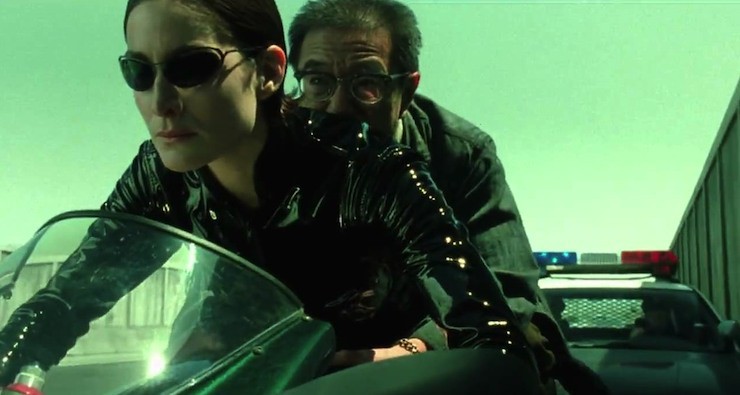
While it’s true that certain sequels simply aren’t good, I believe that there is an oft overlook root to this problem; if your first story seems complete, then any attempt to revisit it and change the game is bound to upset your audience. It’s a natural impulse—you enjoy a story, and then the ending that you thought you had arrived at is overturned, nulling what you enjoyed.
I might be an odd duck, but this problem never bugged me, primarily because I don’t mind holding multiple versions of the same story in my head. So I can think of the first film as a single story, and then entertain a different version where the narrative continued. This pretty much sums up how I feel about the Matrix trilogy—I don’t mind the continuation of the narrative because it doesn’t destroy the “purity” of the first story for me. If that makes sense.
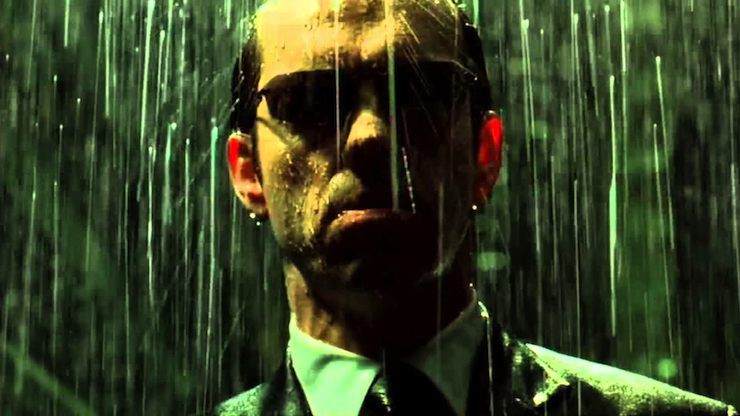
With this in mind, my feelings on these films pair down like this: Matrix Reloaded is a film with a lot of interesting ideas, and more excellent action sequences. Matrix Revolutions is pretty much a mess, being tonally out of step with everything else that we’ve observed up until that point.
Neo’s phone call to the machines at the end of The Matrix is an excellent set up for more films because he refuses to cast his enemies as simple villains. He tells them plainly that he believes they could learn how to coexist, but that’s up to them. It opens the door to considering what these antagonists might actually want from the future, and if some sort of detente could be reached. You can’t help but wonder where that ultimatum will lead, and what sort of climate that will create going forward.
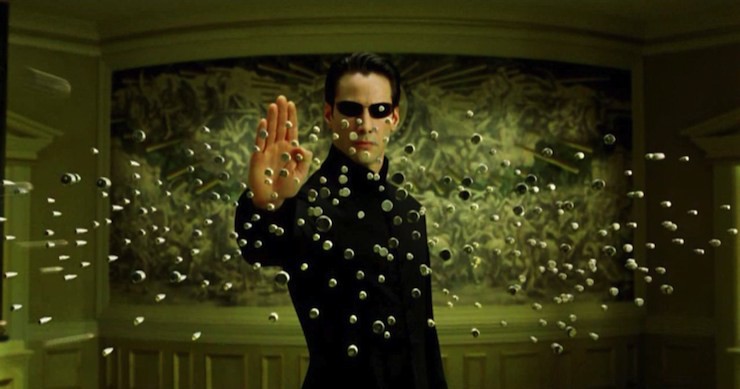
There are so many environmental factors and little winks that make Reloaded an interesting ride. Perhaps my favorite in this film is Neo’s choice of accouterments within the Matrix itself; when he believes he is The One, his clothes take on a monk-like style—the high collar, close to the body but fanning out at the legs. My guess is that the choice is subconscious on Neo’s part, embodying the role once he believes he’s meant to. Watching Neo manipulate the environment with ease at the start of the film is exciting, and easily gives way to the more complicated themes that the film tackles.
Unfortunately, one of the only things anyone remembers from the sequel is the party/orgy scene because it Goes. On. Forever. I understand the impetus behind showing the party due to the atmosphere of ‘haha we might all die tomorrow’ but there’s a problem when the scene itself drags beyond the point of audience attention. (Remember the sex scene in Watchman? Same problem.)
It’s too bad that ends up being the takeaway because it prevents the Wachowskis from getting credit in one of the most important aspects of the Matrix mythos: the world they created is beautifully diverse at every possible level. It was present in the first film, of course, but the trilogy manages to flesh out the world well enough that we see its not simply due to Morpheus’ hiring practices. Zion is just as diverse as planet Earth, simply scaled down, and all of these people are treated and viewed equally because there aren’t enough humans left to get caught up in petty squabbles. The same can be said of the Matrix itself, where even the programs the characters encounter represent a diverse population and render themselves as such. All of these characters have their own journeys and their own stories, equally important to Neo’s quest as The One. And I’d argue that’s a strength rather than a weakness, though it needs more fleshing out than two more films can offer.
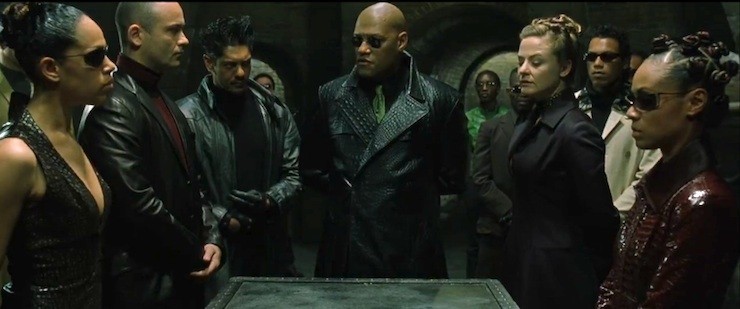
On a side note, I would probably go into battle anywhere for Jada Pinkett Smith’s Niobe. Basically in love with her. Yeah. Swoon.
The politics of Zion play well into the world that The Matrix sets up. Of course it stands to reason that not everyone agrees with Morpheus’ near-religious convictions, and those tensions are bound to run through their society. But the people who disagree with Morpheus are never demonized, which puts the narrative a cut above in my mind. People without faith are not Bad People in this universe, and neither are the people with faith. It’s a refreshing choice, storytelling-wise.
Reloaded calls all the ideas of chosen ones and prophecies into question by kicking off with a deeply unsettling conversion with the Oracle. It forces the viewer to consider the Matrix more logically, as its own reality with its own with rules. By that token, it makes sense that the Oracle is a program rather than a person, and Neo’s concern around trusting her is wise. The film is clever about telegraphing what the endgame might be here; the key maker talks of how everyone must play their part, the Merovingian mentions the five more that came before Neo. (In the original Matrix script, Morpheus was said to have tried out five other potentials before Neo, who all died fighting agents. Reloaded changes this suggestion so that this has played out over five different lifetimes, before Morpheus.)
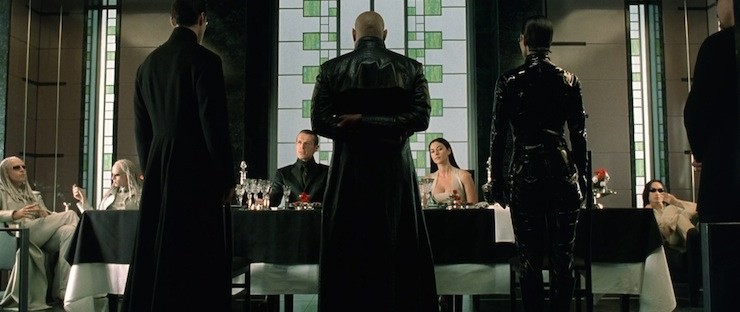
There a lot to be said for the journey of Morpheus through these films, being the Man of Faith who believes in a prophet or chosen one, and has that faith tested at every turn. Morpheus is the true believer of these movies, and in that respect, the entire trilogy belongs to him. He may be the central figure far more than Neo or Agent Smith (who is favored by fans as the true “One” in certain circles). The entire narrative revolves around Morpheus’ unshakable belief—beliefs that ultimately pay off to the benefit of all. His faith drives the story.
The action scenes in Reloaded are as smart as they are bombastic, from Neo’s fights with too many Agent Smiths to the highway chase (oh god it’s so long, too long and I don’t even care, I love it so much). You can see the Wachowskis perfecting their vocabulary in this film, which makes the whole exercise worth it, even if this movie isn’t your particular cuppa.
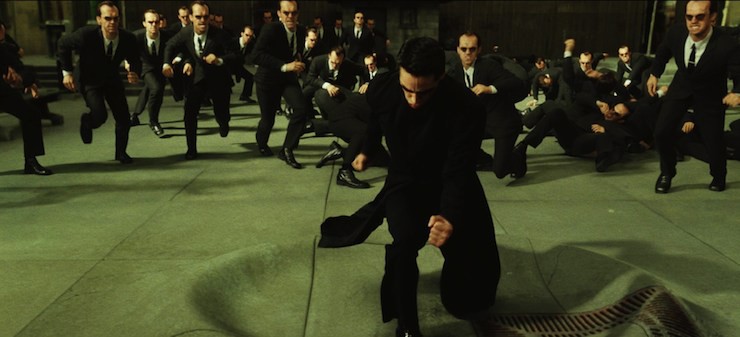
I can see how the eventual reveal from the Architect—the fact that The One is basically an idea propagated by the Matrix itself to deal with the rogue human element in their system—rubs some fans the wrong way, particularly if the first film seemed perfect. But the idea that a highly-advanced group of AIs that managed to enslave the entire human race wouldn’t have a concept of rebellion is ridiculous. The unbreakable nature of the human spirit is a great thing to put in your Star Trek episode, not in this narrative. Otherwise the Matrix itself seems silly and full of holes that should be easy for your average person to exploit. As a cliffhanger, having Neo chose to go against the grain of all his former predecessors and refuse their solution, makes for excellent suspense.
The problem is, once we reach Revolutions, the story gets put on hold in favor of the war between the people of Zion and the machines. Some sections of this drawn-out battle are excellent, but it goes on for so long that the action eventually becomes exhausting. The greater disappointment is that most of these sequences are set in the “real world,” which prevents us from getting to enjoy the stylization that the first two films excel at. Everything that happens in terms of story is well-conceived and interesting, but it gets so lost between endless rounds of fire and weird robot drills.
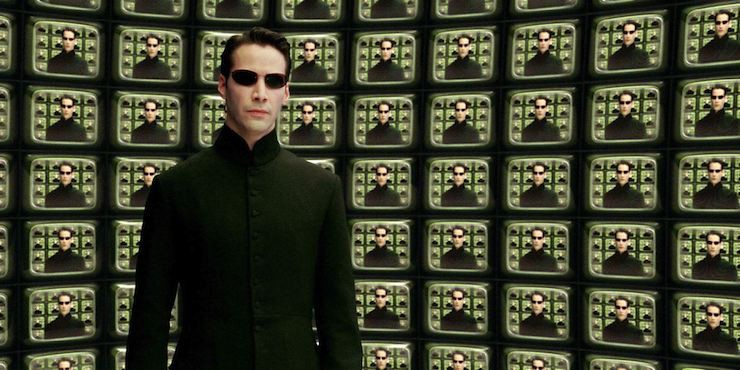
Agent Smith is meant to be central to this final chapter, but his desires get lost between these two films. His anger and ego are clear drives in Reloaded, but by Revolutions, it’s hard to understand precisely what he wants and what is driving his continued obsession. He’s basically destroying the entire system because he wants to, and the Matrix itself realizes that it needs to be rid of him to continue functioning. But what specifically is driving this desire in Agent Smith? After going on about humanity-as-virus, has he merely become the thing he abhorred? Or does he believe that he is changing his world for the better? For a character of such importance, he gets practically no time to breath at all in the final film.
There are certain botches in the tale that get glossed over here as well. For example, if this is a sixth generation of humans to be wiped out by the machines, then the first Matrix film did not set the story far enough in the future (it claims to be in the latter half of the 22nd century). The elders seem to be in their sixties, at least, so each generation lasts about 30-35 years? Maybe longer, though, because some of the adults who are not elders appear to be in their forties? In addition, if we assume that some of the people who were “selected” by the former One to create the new generation are still alive (the elders?) then those people should know about this cycle of destruction, meaning they are actively hiding it from the rest of the population. The other possibility is that the machines just keep engineering things so that humans assume that only 100-150 years have passed since AI takeover. Perhaps we’re really in the 27th century here, and all that information is being withheld. Important things that I want answers to!
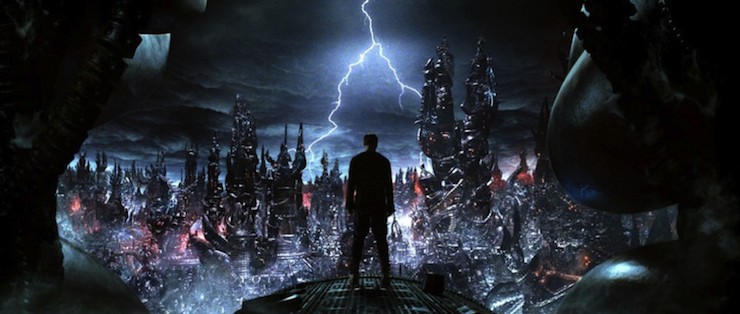
My biggest problem surrounds Trinity’s death, of course. And again, it comes down to a lack of specificity. Reloaded makes the point of Neo having crappy “vision nightmares” about her death that he actively reverses by the end of the film, flipping the standard trope on its head. But then she dies in Revolutions anyway, thereby nulling the work that the previous film did. In truth, I don’t think that Trinity’s death is automatically a mistake, but I do think that the narrative shies away from what should have been the final central theme for Neo’s journey; the only reason Neo is the true “One” who manages to do what each of his predecessors could not is because of Trinity. Their love for each other is what enables this war’s end. If it was suggested that perhaps the others failed because they were alone, or because they lost the person they loved early on, then the love between Neo and Trinity love becomes something transcendent. It saves the world.
There’s a lot of that happening in these films, so it seems like that should be the central theme. Morpheus and Niobe, Zee and Link, even the poisonous thing between Persephone and the Merovingian, all of those relationships are essential to the movement of this narrative. If we presume this for Neo and Trinity as well, then the Matrix trilogy does something truly beautiful by going beyond Neo’s self-actualization as The One—love is what defines him as a hero. Love is what saves both of these worlds.
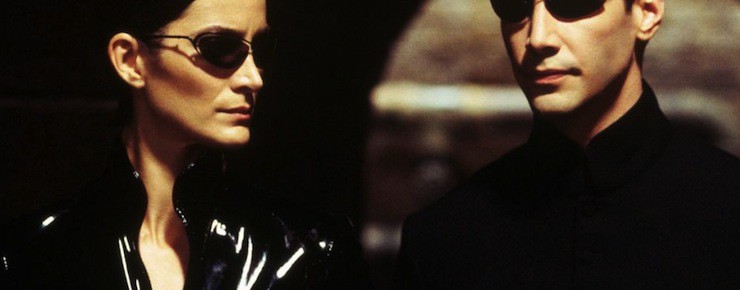
Like so many genre stories, all the real meaty questions about this world come after the tale is complete—What sort of world will humanity and machine build together? Will some people choose to stay in the Matrix? What will the Matrix become following the cease in hostilities? How will the programs enjoy their newfound freedom?
While the Matrix Trilogy is far from perfect, its resolution is more thought-provoking than your average action-driven series—which makes its legacy far more potent than its often given credit for.
Emmet Asher-Perrin wants all of Morpheus’s purple waistcoats. You can bug her on Twitter andTumblr, and read more of her work here and elsewhere.










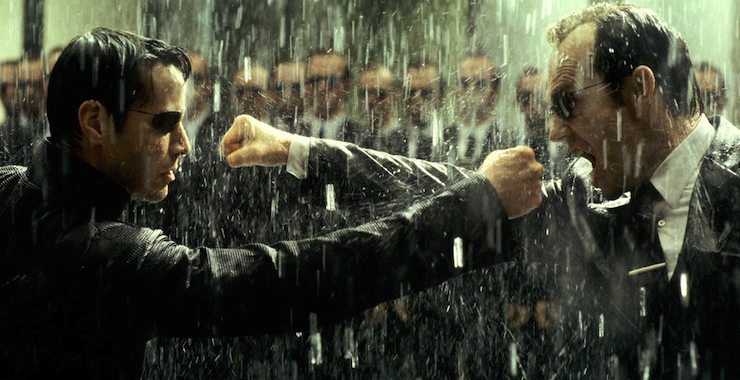
I actually really liked Reloaded before Revolutions came out because there was potential at the end. I recall the many debates I had with friends if we’re dealing with maybe a Matrix WITHIN a Matrix once Neo states “I can feel them.” So many possible implications for why he can save them in the real world. Then sadly Revolutions came out and that was just Neo being Neo feeling robots outside of the Matrix.
I also thought the music was just fantastic! Especially Rob D’s score during the Weapon-Wall Foyer fight scene.
I count the reveal that Zion was just another system of control as one of the biggest twists I’ve experienced in a film. I did not see it coming and it floored me. I saw Reloaded many times until I felt like I really got it. Then I watched with friends in college and kept pausing it through the Architect’s speech to explain what was going on. (They requested this by the way. It makes me sound insufferable not to add that fact, I realize.)
Revolutions was a let down in so many ways. The pacing just feels off and the upside-down lobby fight is boring and uninspired. I do remember feeling the final fight was straight out of Superman, and sure enough Man of Steel‘s finale is so similar.
It was awful when the wonderful actress that played the Oracle passed away, and they address it in the movie by the Oracle having a new shell after her old one is destroyed, but I wish the new Oracle’s form could have been physically different, maybe even a child. I think it would have emphasized her nature as a program. Within the context of the film the explanation given doesn’t make sense if she just resumes an only slightly physically different appearance.
I do like the sequels — well, mostly Reloaded, which I think has some of the best action sequences in the entire trilogy (the highway chase in particular). I think it also raises a lot of questions that never really get answered — for example, how many people are the Machines actually keeping podded up? And are all of those people sharing the same virtual space? And how big is that space, really? In the first movie, I certainly got the impression that the virtual world was, well, pretty much an entire world, and just about the entire population was podded humans plus maybe a few Agents to keep them in line. In the second & third movies, the virtual world starts to feel a lot more … claustrophobic, with a lower population and more living programs than we’d originally been led to understand. Maybe the machines only have a few million humans, and they keep them all in the City? Maybe they only create such portions of the world as actually have a human present to see them?
The other problem with Revolutions, I think, is that it had too many confrontations (Neo vs. Trainman, the second visit to the Merovingian) that just kind of fell flat. And the pacing was weird — the giant fight in Zion was spectacular, but should’ve been broken up somehow.
Recently I’ve come to the same realization that you can stop at part 1 or 2 or whenver and the story doesn’t have to be ruined by the sequels. I think it’s also interesting that Hunger Games Book 1 is also standalone. But the second two books are back-to-back just like The Matrix.
“if this is a sixth generation of humans to be wiped out by the machines, then the first Matrix film did not set the story far enough in the future (it claims to be in the latter half of the 22nd century). The elders seem to be in their sixties, at least, so each generation lasts about 30-35 years?”
I don’t really see any problems with the timeline. Doesn’t Morpheus say that Zion has been fighting the machines for 100 years during his speech in the cave so a hundred years a cycle seems likely. Also any discussion as to when the film takes place within the film is by human characters who are unaware of the cycles, Morpheus tells Neo in the first film that they don’t actually know what year it is.
Overall though I agree with most of the article. The first film is a classic that I could watch again and again. Reloaded contains some great ideas and the trilogy’s best action scenes but I tend to find my attention wandering when I watch it. As for the third I tend to not make it through the whole film.
I have no idea what this article is talking about… after all, everyone knows they never made any sequels…
My theory was that it wasn’t actually 2199; the current cycle had lasted 200 years, so they just assumed it was 1999+200 = 2199, when it was actually 1999+200+[however many years for the previous cycles].
After seeing these sequels once, I didn’t need to see them again. The Matrix was great all by itself, and something I would watch again.
Thank you for a good article on a subject that I am still split on. I love the Matrix, and I really enjoyed 2 and 3, but they lacked little things in too many ways. I very much appreciated this: “So I can think of the first film as a single story, and then entertain a different version where the narrative continued.” I have previously tried to explain this mindset, but now I can link this article :-)
I definitely agree about the orgy and the war on Zion. In my own writing, or role-playing, every time I get the urge to write something epic, I pause and ponder whether I am about to oversell something.
@1:
I, too, left the Theater after the premier of Reloaded thinking Zion was just a deeper level of the Matrix, and I was floored with how brilliant it was… and then… it wasn’t. And Revolutions was more disappointing than just that, for all the reasons Emily mentioned.
When I saw “Reloaded,” even though it was/is a flawed film, I was really excited for the next one. Like Emily says, “Reloaded” had a LOT of potential. I also agree with Emily that the love between Neo and Trinity is basically at the core of the entire narrative.
So, where I THOUGHT the narrative was going…
I predicted that in “Revolutions,” Neo and Trinity were basically going to have to enact the “hierogamos” with/within the Matrix and the machines, giving birth to an entirely new world/way of being that would unite humans and the A.I.s in basically a cyberpunk re-inscription of the Garden of Eden. (This also made me feel better about the “hand-waving miracle” way that Neo and Trinity kept saving each other’s lives, because they were fated to be the progenitors of an entirely new world.)
“Revolutions”…did not do this. It’s the Wachkowskis’ narrative, not mine, of course, but I still prefer my head-canon.
@1, @10,
I feel the same way. After Reloaded, my mind was blown. Then Revolutions came along and totally unblew my mind. Was it ever adequately explained why Neo was able to control machines in the real world?
@12 — He upgraded to Bluetooth.
It’d actually be interesting to see what happened after the end of Revolutions. My own theory: Most people, given the choice, would be perfectly content to stay in their pods, especially if the machines agreed to shave some of the rougher edges off of the simulation.
I liked all three movies, but I wasn’t thinking about the story over much, they were just great looking with frantic and terrific action.
I definitely enjoyed both sequels but they weren’t as good as the original. The anime was kinda fresh too …
but I do think that the narrative shies away from what should have been the final central theme for Neo’s journey; the only reason Neo is the true “One” who manages to do what each of his predecessors could not is because of Trinity. Their love for each other is what enables this war’s end. If it was suggested that perhaps the others failed because they were alone, or because they lost the person they loved early on, then the love between Neo and Trinity love becomes something transcendent. It saves the world.
See, I disagree that the narrative shies away from this. I think it’s pretty blatant when you learn the Oracle has been trying to get to this endpoint for some time, and that the Oracle is the one who engineered Neo and Trinity’s love in the first place.
My theory about Smith has to do with external versus internal “purpose.” As an atheist myself, I have become comfortable with the idea that my life does not have and does not need any “greater cosmic purpose” with any divine being in control. So on to Smith, in the first movie he is created with a specific purpose by a creator, then when he is disconnected from the greater system his struggle and motivation is “what is my purpose?” He is constantly talking about what is purpose and what is he there to do, what is Neo there to do etc. Then in the end he tells Neo that he realized that the purpose of life is to end. I both agree and disagree with that idea, but that is a whole long conversation.
Hate to nitpick here, but:
“This problem is true in series where a serial aspect should be expected (Indiana Jones, Back to the Future), and in series where the first film presents a perfect closed circuit story that stands on its own (Alien, Terminator). Sometimes the first sequel gets lauded and showered with praise, at least retroactively—true for Alien 2, Godfather 2, Terminator 2, and The Empire Strikes Back—and sometimes it doesn’t. But it is a particular syndrome nonetheless.”
Terminator 2 was pretty heavily loved right away, if I remember right.
As for Aliens, Signourney Weaver was nominated for Best Actress at the OSCARS. Hardly a retroactive showering of praise!
Other than that, I agree with most of what is said here about the movies. Reloaded, once the Merovingian shows up, is great. Until then, snoozefest.
@18:
I won’t try to interpret the OPs actual intent but this sentence..
…doesn’t structurally preclude Terminator 2 and Aliens from being loved immediately. Its ambiguous, to be sure, but the list could be a list that received praise regardless of when the praise was received.